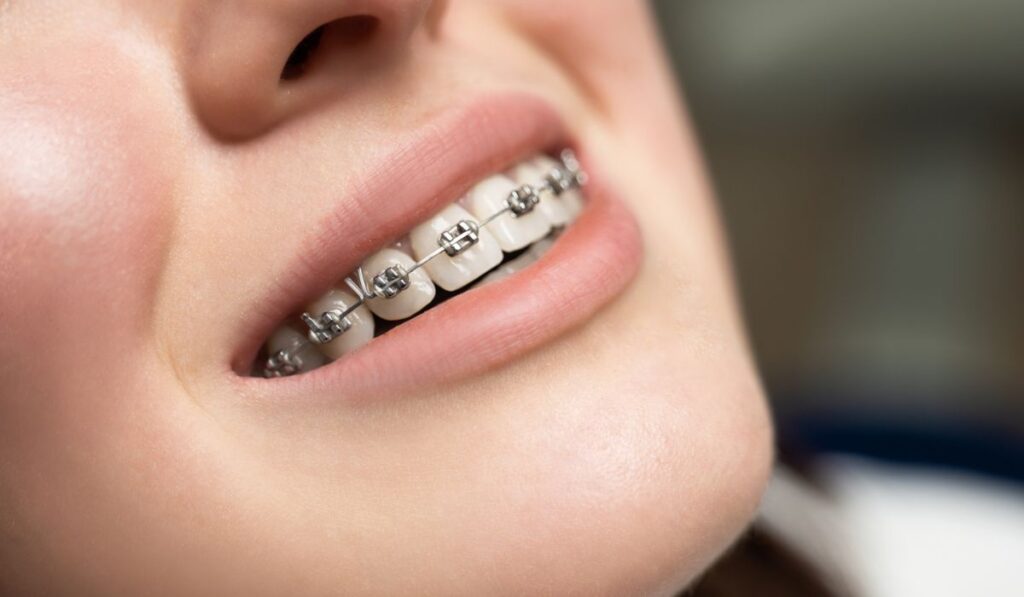Orthodontic treatment isn’t always sunshine and rainbows. Braces put stress on your teeth as they realign your smile, and they can cause you a great deal of pain and discomfort if you already suffer from tooth and gum sensitivity. So, how do you manage the pain?
You can ease the pain from braces by eating soft foods, icing your mouth, and applying an oral anesthetic. Alternatively, you can cover the irritating brackets with orthodontic wax to prevent them from inflicting cuts and sores in your mouth. And above all, keep maintaining good dental hygiene.
Most people are concerned that braces lead to unbearable pain and discomfort, especially if they have sensitive teeth. Let’s take a look at what causes tooth sensitivity, what effect braces have on that, and how you can manage the pain.
Do Teeth Get More Sensitive With Braces?

Because braces put pressure on your teeth and gums, they may intensify any preexisting pain or sensitivity. However, this is more often a temporary problem you’ll quickly get over within a couple of days.
Preexisting tooth sensitivity is always a big concern for most people considering braces. Understandably, the only way braces guarantee a perfect smile is by gently shifting your teeth and neatly pulling them together.
As it turns out, this can easily make your teeth more sensitive than normal. The discomfort will, however, quickly disappear within days as your teeth and gums get used to the adjustment process.
While braces typically cause minor tooth sensitivity, they shouldn’t give you ongoing discomfort. If you feel they’re worsening your condition or causing more complications, please consult your orthodontist for immediate alternative treatment.
How Do You Get Rid Of Sensitive Teeth From Braces?
While you may feel some pain and discomfort right after an orthodontist has placed or adjusted your braces, there are simple tricks to give you relief. Here are a few ways to get rid of sensitive teeth from braces:
Eat Soft Foods
Eating soft foods like noodles, mashed potatoes, cereal, and soup will help you get nourishment without putting additional strain on your teeth. And if you’re not sensitive to cold, treating yourself to a bowl of ice cream often comes in handy to reduce the inflammation.
Ice Your Mouth to Reduce Inflammation
Rest an ice pack wrapped in a towel outside your mouth at 15-minute intervals to reduce inflammation and give you relief from braces-induced sensitivity. Moreover, you can sip a nice cold glass of ice water to numb your mouth after an orthodontic appointment.
Maintain Good Dental Hygiene

How you take care of your teeth with braces always makes a difference in the level of sensitivity you’ll experience. You need to brush thoroughly, floss, and rinse your mouth with mouthwash to ward off tooth decay and gum inflammation.
Remember, expect more food particles in your mouth if you have braces because of the brackets, wires, and spaces between them.
Use Oral Anesthetic and Pain Relievers
Rubbing an oral anesthetic like Anbesol (on Amazon) directly on your teeth and gums helps desensitize them so you won’t feel the acute pain of shifting teeth. You can also take over-the-counter pain relievers like Advil an hour before your orthodontic appointment to ease off the discomfort during and after the appointment.
Apply Orthodontic Wax
Orthodontic wax (on Amazon) is specially made to protect the inside of your lips, cheeks, and gums from the brackets used with braces. Molding the wax over the brackets that cause irritation creates a barrier that keeps off the sharp edges from scratching soft mouth tissues.
What Causes Tooth Sensitivity?
Tooth sensitivity is a common occurrence, affecting as many as 12.5% of adults. It’s also something you expect to deal with when undergoing orthodontic treatment. Here’s a quick overview of the leading causes of tooth sensitivity:
Brushing Too Hard or Too Frequently
Using a brush with hard bristles or using too much force while brushing quickly wears down your gum line and tooth enamel. As your gums recede, they expose the porous root surfaces with lots of nerve endings, and this causes some teeth to become extremely sensitive.
The problem will also occur if you brush more than thrice a day or if you frequently use abrasive toothpastes like charcoal toothpaste. Brushing with charcoal toothpaste can also cause particles to lodge in between brackets. Please stick to ADA-approved toothpaste and brush gently twice a day — and always with a soft or extra soft toothbrush.
Thinning Enamel and Gum Recession As You Age
Poor brushing habits and improper dental hygiene will quickly lead to plaque buildup on your teeth. The bacteria that live and feed on the plaque produce acids that gradually wear down your tooth enamel, exposing them and leaving them more vulnerable to sensitivity. Thankfully, there are several proactive measures that can be taken when it comes to preventing weakened enamel.
The natural aging process also leads to gum recession, a common cause of tooth sensitivity. However, it’s worth noting that braces can actually aid in preventing gum recession, as they realign teeth that may have previously been difficult to clean. Dentists recommend using a soft-bristled toothbrush in a gentle up and down motion to reduce your risk of developing tooth sensitivity.
Acidic Foods and Beverages
Acidic soft drinks, fruit drinks like orange juice, wine, coffee, and sour fruits wear down the enamel. Acid often leaves the enamel softened and more susceptible to erosion when brushing.
Dentists recommend that you rinse your mouth with water after you’ve consumed any acidic foods or drinks to dilute the acid. And if you must brush your teeth afterward, please hold back for at least an hour.
Irritation From Teeth Whitening Products
Most teeth whitening products contain ingredients like hydrogen peroxide, which can cause irritation and inflammation. They irritate the tooth nerves, making you develop symptoms like cold sensitivity and a prickling sensation.
Regularly Scheduled Adjustments
As an orthodontic patient, treatments involving regularly scheduled tooth adjustments can shift your teeth from their normal positions, making them more sensitive. You might also experience some pain or soreness in your cheeks a short period after you’ve had braces or something similar, like Invisalign.
Teeth Grinding
Grinding your teeth in your sleep can lead to tooth sensitivity as the action gradually wears down your enamel. Wearing a mouthguard (on Amazon) when you sleep can help you prevent this.
How Long Will My Teeth Be Sensitive With Braces?
Your teeth should only be sensitive within the first four days after your braces are fixed, and the pain usually disappears in about one week. Most people report feeling mild pain and discomfort only immediately after the orthodontist places or adjusts their braces — it’s a normal side effect.
While you could experience irritation and soreness due to the wires and brackets rubbing against your cheeks, it’s just a short-term inconvenience. And if your orthodontist advises you to go for adjustments, don’t freak out, because it won’t worsen the situation.
Plus, fixing your orthodontic issues now is the best decision if you’re looking to have stronger teeth that are less prone to sensitivity. And to crown it all, you’ll have more reason to show off a stunning, new smile.
Carefully follow the instructions given with the wax, reapplying it after brushing your teeth and following meals.
Rinse Your Mouth With Warm Salt Water
Just like ice can do the trick, rinsing your mouth with warm salt water often comes in handy to relieve sensitivity. Moreover, it can help heal the sores and lesions braces can induce on your gums and mouth.


